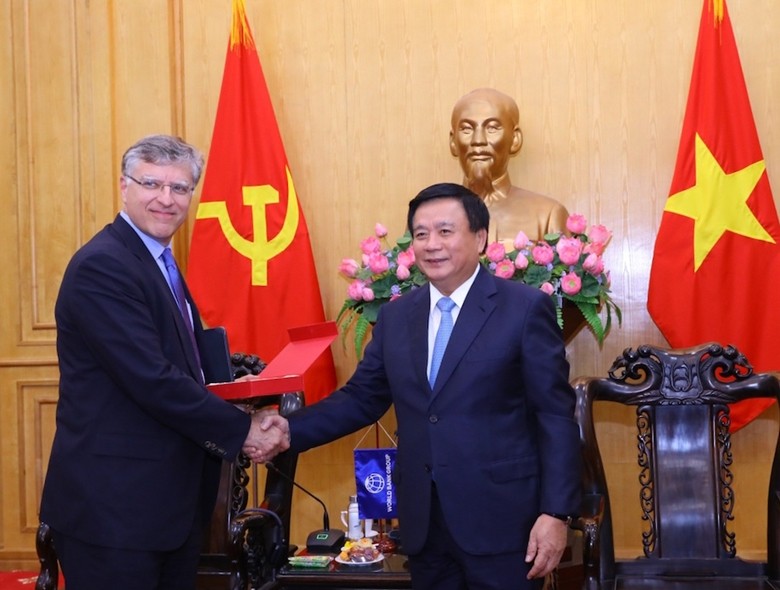 |
| Politburo member, Chairman of the Central Theoretical Council and President of the Ho Chi Minh National Academy of Politics Nguyen Xuan Thang (right) and Global Director of the World Bank (WB) Group’s Macroeconomics, Trade and Investment Global Practice Marcello de Moura Stevão Filho. Photo: VNA |
Vietnam should come up with solutions to bring benefits for short, mid and long-terms, helping the economy to develop stronger towards becoming a high-income country by 2045, said Global Director of the World Bank (WB) Group’s Macroeconomics, Trade and Investment Global Practice Marcello de Moura Stevão Filho, VNA reported.
In a meeting in Hanoi on November 4 with Politburo member, Chairman of the Central Theoretical Council and President of the Ho Chi Minh National Academy of Politics Nguyen Xuan Thang, Filho said short-term solutions to stabilise the economy at the moment could undermine long-term goals.
According to the official, there are many ways to develop a sustainable economy in a long term and Vietnam has taken proper actions so far.
He said the WB is ready to work with the country to build Vietnam Report 2045, adding that it will strive to seek necessary resources to conduct the study in the coming time.
Thang said Vietnam advocates addressing immediate issues like culture, economy, politics, security and external affairs in order to create a premise for dealing with long-term matters.
 |
| Delegates pose for a group photo. Photo: VNA |
Ensuring the security, welfare and health of people is always the goal in every step and policy of Vietnam, he said, adding that it requires huge resources to deal with both social and economic development issues.
Thang also stressed the need to protect a peaceful environment and achieve harmonious, sustainable development in a changing world as inflation, natural disasters, floods, and epidemics are affecting the economic growth of many countries, including Vietnam.
The bank’s October report, Vietnam Macro Monitoring, shows that Vietnam’s GDP grew by 13.7% year-on-year in the third quarter of this year and 8.9% over the first three quarters.
According to the report, while the economic recovery has remained strong, heightened uncertainties related to the slowing global economy, rising domestic inflation, and tightening global financial conditions warrant increased vigilance and policy agility.
Given the economy has not fully recovered and growth in main export markets is expected to slow, continued active fiscal policy to support the economy should be closely aligned with economic outcomes and coordinated with monetary policy.
At the same time, as CPI and Core CPI are reaching 4% – the policy rate set by the authorities – monetary authorities should be ready to consider further tightening of monetary policy to ensure inflation remains anchored.
Given the end of forbearance and tightening financial conditions, the financial sector faces heightened risks and prompt SBV guidance would help stem materialization of such risks at the sector level, potentially affecting the real economy.








